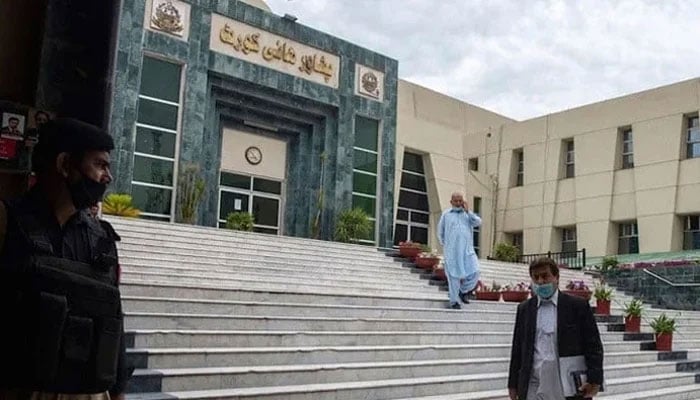Protective, transit bail granted to PTI leaders, lawmakers
PHC grants transit bail to MNA Shahram Tarakai and his brother and KP Minister Faisal Tarakai
PESHAWAR: The Peshawar High Court (PHC) on Thursday granted protective bail to the Pakistan Tehreek-e-Insaf (PTI) leaders and directed them to appear before the relevant courts.
The PHC also granted transit bail to Member National Assembly Shahram Tarakai and his brother and provincial Minister Faisal Tarakai.
A two-member bench comprising Justice Wiqar Ahmed and Justice Ijaz Khan Sabi heard the protective bail applications of PTI leaders including Raoof Hassan, Khadija Shah, Naeem Haider Panjutha advocate, Irfan Saleem, Abrar Hussain and Member of the National Assembly Mehboob Shah.
The petitioners’ lawyer Alam Khan Adenzai informed the court that his clients were associated with the PTI and faced cases registered against them in Islamabad and Rawalpindi following the November 24 protests. He argued that the petitioners intended to appear before the relevant courts but feared arrest before they could do so. He prayed the court to grant protective bail to enable them to appear in courts concerned.
After arguments, the court granted protective bail to the PTI leaders and lawmakers and directed the petitioners to appear before the relevant courts by January 16 and barring the authorities from arresting them until then.
Meanwhile, the court also granted transit bail to MNA Shahram Tarakai and provincial Minister Faisal Tarakai.
Alam Adenzai while representing the petitioners told the court that six cases had been registered against Shahram Tarakai and two cases against Faisal Tarakai.
He prayed for an extended period for the transit bail due to the numerous cases against them.
The court granted one month of transit bail to the petitioners and ordered them to appear before the relevant courts during this period.
-
 AOC Blasts Jake Paul Over Bad Bunny Slight: 'He Makes You Look Small'
AOC Blasts Jake Paul Over Bad Bunny Slight: 'He Makes You Look Small' -
 At Least 53 Dead After Migrant Boat Capsizes Off Libya
At Least 53 Dead After Migrant Boat Capsizes Off Libya -
 'God Of War' Announces Casting Major Key Role In Prime Video Show
'God Of War' Announces Casting Major Key Role In Prime Video Show -
 Real Reason Prince William, Kate Broke Silence On Andrew Scandal Revealed
Real Reason Prince William, Kate Broke Silence On Andrew Scandal Revealed -
 Drew Barrymore Responds To 'Charlie's Angels' Costar's Comments About Her
Drew Barrymore Responds To 'Charlie's Angels' Costar's Comments About Her -
 Shakira Slips Hard On Stage During Life Show
Shakira Slips Hard On Stage During Life Show -
 King Charles Speaks Out Over Andrew's Scandal: 'Stand Ready To Help Police'
King Charles Speaks Out Over Andrew's Scandal: 'Stand Ready To Help Police' -
 Dax Shepard Recalls Horrifying Accident That Almost Killed Him
Dax Shepard Recalls Horrifying Accident That Almost Killed Him -
 Logan Paul's Bodyguard Hits Fan On Super Bowl Day
Logan Paul's Bodyguard Hits Fan On Super Bowl Day -
 Epstein Files: Anne Hathaway Mentioned As Highly Desired Guest For Bill Gates?
Epstein Files: Anne Hathaway Mentioned As Highly Desired Guest For Bill Gates? -
 Prince Harry Under A Lot Of Stress As Meghan Markle Makes Bizarre Demands
Prince Harry Under A Lot Of Stress As Meghan Markle Makes Bizarre Demands -
 Princess Beatrice, Eugenie's Subtle Break From Disgraced Parents Exposed
Princess Beatrice, Eugenie's Subtle Break From Disgraced Parents Exposed -
 Baby Left In Running Bathtub Dies After Father ‘forgets’ Him
Baby Left In Running Bathtub Dies After Father ‘forgets’ Him -
 King Charles Takes A Major Step To Keep Horrified Prince William Out Of The Loop On Andrew: Insider
King Charles Takes A Major Step To Keep Horrified Prince William Out Of The Loop On Andrew: Insider -
 Taylor Swift Set To Make Biggest Cut From Her Wedding Guest: Blake Lively Or Ryan Reynolds
Taylor Swift Set To Make Biggest Cut From Her Wedding Guest: Blake Lively Or Ryan Reynolds -
 Prince William Meets Saudi Crown Prince Mohammed Bin Salman
Prince William Meets Saudi Crown Prince Mohammed Bin Salman




